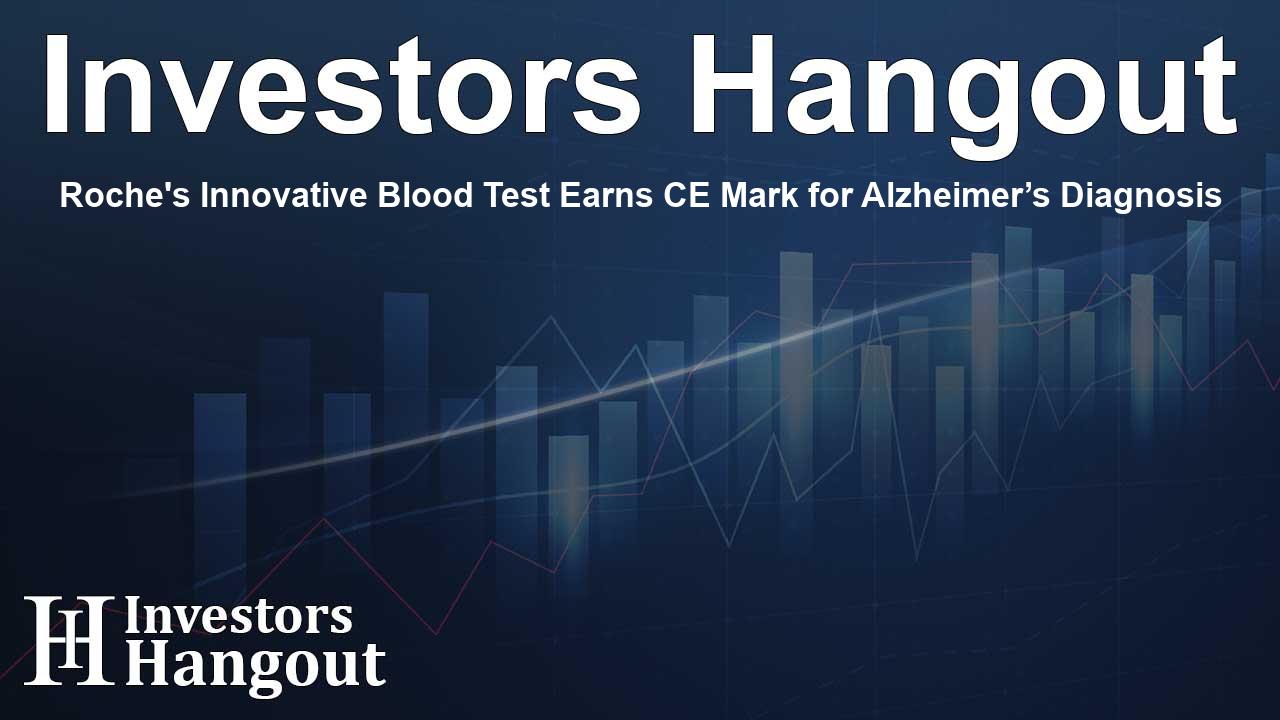Roche's Innovative Blood Test Earns CE Mark for Alzheimer’s Diagnosis

Roche's New CE Mark for Blood Test in Alzheimer’s Diagnosis
Roche has recently achieved a significant milestone with the CE Mark authorization for its Elecsys pTau181 test, a pioneering blood test designed to aid in diagnosing Alzheimer’s disease. This innovative test measures the phosphorylated Tau (pTau) 181 protein, a crucial biomarker associated with Alzheimer’s-related amyloid pathology. Developed in partnership with Eli Lilly and Company, the Elecsys pTau181 test offers clinicians a reliable tool in assessing cognitive decline.
Minimally Invasive Testing: A Game-Changer
The Elecsys pTau181 is the first In Vitro Diagnostic Regulation (IVDR) certified test capable of ruling out Alzheimer’s associated amyloid pathology. What sets this test apart is its minimally invasive nature, relying on a simple blood draw instead of more intrusive methods like positron emission tomography (PET) or cerebrospinal fluid (CSF) tests, which can be cumbersome and expensive. With a negative result from the Elecsys pTau181, patients can avoid unnecessary further investigations, streamlining their care process.
Bridging Gaps in Early Diagnosis
One of the daunting challenges in managing Alzheimer’s disease is the delay in diagnosis. Studies reveal that up to 75% of individuals showing symptoms of cognitive decline remain undiagnosed, with diagnosed patients often waiting nearly three years post onset of symptoms. This can lead to increased suffering, not just for the patients but also for their families and caregivers. The Elecsys pTau181 test aims to address these challenges by providing an earlier, clearer understanding of cognitive health.
Impact of Clinical Research on Test Validation
The foundation for the Elecsys pTau181's CE Mark was laid during a comprehensive multicenter clinical study involving 787 patients across various countries. The results showcased an impressive negative predictive value (NPV) of 93.8%, making it a robust tool in ruling out Alzheimer’s disease, coupled with a sensitivity of 83.6%. Notably, the performance of this test remained consistent across various demographics, including age and body mass index, marking it as a versatile assessment option.
Expanding Roche’s Diagnostic Horizons
In addition to the pTau181 test, Roche is advancing its pipeline with the Elecsys pTau217 blood test. This newer test focuses on the pTau217 protein and is also expected to enhance the accuracy of identifying amyloid pathology. Early data indicate that the pTau217 test can maintain stability under various temperature conditions, which is a crucial factor for routine clinical applications.
Addressing Global Alzheimer's Challenges
With over 20 years of investment in Alzheimer’s research, Roche is unwavering in its commitment to improve detection and treatment. Its robust Alzheimer’s portfolio includes not only innovative diagnostics but also investigational therapeutics tailored to different stages and types of the disease. Roche's approach embodies a comprehensive strategy to tackle Alzheimer’s, intending to evolve patient care through collaborations both within and outside the healthcare sector.
Sustaining Innovation for Better Health
Founded in 1896, Roche has transformed into a global leader in biotechnology and in-vitro diagnostics. The company is dedicated to scientific excellence and pursues innovative solutions that improve the quality of life for patients worldwide. Moreover, sustainability is a vital aspect of Roche’s mission, with concerted efforts aimed at achieving net-zero emissions by 2045, emphasizing responsible innovation in health care.
Frequently Asked Questions
What is the Elecsys pTau181 test used for?
The Elecsys pTau181 test is used to measure the phosphorylated Tau (pTau) 181 protein to help rule out Alzheimer’s disease by indicating amyloid pathology.
How does the blood test compare to other diagnostic methods?
This blood test is less invasive compared to traditional methods like PET scans or CSF assessments, making it easier for patients to undergo diagnostics.
What were the results of the clinical study for the test?
The clinical study demonstrated a high negative predictive value of 93.8%, indicating the test's reliability in ruling out Alzheimer’s disease.
How can this test impact patient care?
By providing clarity in diagnosis, the Elecsys pTau181 test can reduce the need for further investigations and support timely access to appropriate care.
What is Roche’s commitment to Alzheimer’s disease research?
Roche is dedicated to advancing research in Alzheimer’s disease, focusing on early detection and intervention to improve treatment outcomes for patients.
About The Author
Contact Dominic Sanders privately here. Or send an email with ATTN: Dominic Sanders as the subject to contact@investorshangout.com.
About Investors Hangout
Investors Hangout is a leading online stock forum for financial discussion and learning, offering a wide range of free tools and resources. It draws in traders of all levels, who exchange market knowledge, investigate trading tactics, and keep an eye on industry developments in real time. Featuring financial articles, stock message boards, quotes, charts, company profiles, and live news updates. Through cooperative learning and a wealth of informational resources, it helps users from novices creating their first portfolios to experts honing their techniques. Join Investors Hangout today: https://investorshangout.com/
The content of this article is based on factual, publicly available information and does not represent legal, financial, or investment advice. Investors Hangout does not offer financial advice, and the author is not a licensed financial advisor. Consult a qualified advisor before making any financial or investment decisions based on this article. This article should not be considered advice to purchase, sell, or hold any securities or other investments. If any of the material provided here is inaccurate, please contact us for corrections.
